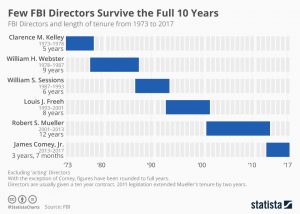Daily Comment (May 10, 2017)
by Bill O’Grady, Kaisa Stucke, and Thomas Wash
[Posted: 9:30 AM EDT] The story dominating this morning’s headlines is the Trump administration’s decision to fire FBI Director Comey. There is much speculation surrounding what is going on with the decision; our focus will remain on the impact on financial markets. So far, it hasn’t had much of an impact. S&P futures are flat, Treasuries are modestly stronger and the dollar is mostly steady. Here are a few of our thoughts:
FBI directors rarely survive their terms.

Of course, the first FBI director, J. Edgar Hoover, served from the bureau’s founding in 1935 until his death in 1972. Hoover was a controversial figure and after his death presidents wanted to regain control of the FBI. Nixon initially appointed Patrick Gray as acting director following Hoover’s death.[1] Later, Clarence Kelly was appointed to the position as full director. Directors are given 10-year terms with the idea that they will be insulated from political influence; that hasn’t worked according to plan. With his firing, Comey has now served the shortest term in the bureau’s history.
The FBI has great power; it is essentially the U.S. equivalent of MI-5, engaging in not only Federal policing but also domestic counterintelligence. Hoover lasted as long as he did because presidents were afraid of the political fallout from removing him from office. Any removal of an FBI director is fraught with risk.
The firing could become a significant distraction. Concerns about Russian involvement in the presidential campaign is a story that simply won’t go away. Our position is that election interference is nothing new. The Soviets tried to keep Reagan from getting elected; recently, President Obama not only endorsed Emmanuel Macron but also recorded a message to French voters. However, there is a line between trying to sway an election and influencing a government. If government officials are compromised by a foreign power, the danger is immense. Gen. Flynn resigned from the NSC over alleged Russian ties. The FBI has an active investigation about Russian activity among officials of the Trump administration. The attorney general had to recuse himself from any involvement in supervising the Russian investigation. This story will remain a problem for the administration and absorb precious political capital, which will reduce the odds of accomplishing other goals, such as tax reform, infrastructure spending and trade policy.
The Nixon overtones are hard to quash. Firing a figure that is conducting an investigation of one’s administration looks like a cover up. That factor is going to be difficult to overcome. One way to manage the story is to appoint a special prosecutor. However, once that door is opened, it becomes impossible to control. President Clinton’s special prosecutor started with Whitewater; it ended with Monica Lewinsky. The key to whether a special prosecutor needs to be appointed will likely come from Senate Republicans. If enough of them decide to press for this action, it will be hard for the president not to acquiesce.
At the same time, the situation doesn’t compare well to Nixon. Although Trump is a political outsider, which Nixon was as well, Trump’s party controls Congress. Nixon faced a Congress controlled by Democrats. There were people in jail tied to the Nixon re-election campaign. Nixon was involved in a cover up. There isn’t clear evidence that the Trump administration has done anything wrong, although the investigation continues.
Comey was controversial. His handling of the Clinton private server investigation was unorthodox. He was clearly a man guided by his own internal compass, which makes him dangerous to power. At the same time, his ability to manage investigations was questionable. At last summer’s press conference, he laid out a case suggesting Clinton was guilty. In our interpretation of his remarks, it seemed to be leading to an indictment but instead, in what appeared to be a surprise, he indicated that the FBI was not recommending that action. The decision to “reopen” the investigation near the election was also controversial. From a partisan standpoint, Republicans are not happy that Clinton wasn’t indicted; for Democrats, Comey turned the election to Trump. Thus, he doesn’t really have a political constituency in Washington that would support him.
This process will be really difficult to handle. By all accounts, the White House moved on this decision without much outside counsel. Aides were caught off guard; Comey himself appeared shocked. It almost appears the White House misinterpreted how this would be taken. The administration may have thought that Comey’s own unpopularity would make the decision popular. Instead, Democrats are pushing for a special prosecutor and Republican reaction has been mixed at best. Now the White House has to appoint a new director who will come under tremendous scrutiny. In fact, the AG usually recommends a new FBI director but Sessions cannot do so because of his Russian recusal. All told, this situation will require a lot of attention.
The bottom line is that this problem will be a distraction. At a minimum, it will take attention away from other priorities, such as tax reform, the ACA repeal, infrastructure spending, etc. As these goals are pushed further into 2018, the less likely they are to be achieved. We have consistently warned that political capital is a wasting asset. By June 2018, it’s gone whether or not a president was able to accomplish anything. As long as the economy avoids recession and earnings remain firm, the market fallout won’t be severe. But, if weakness develops, one cannot expect fiscal and tax policy to ride to the rescue if the administration can’t bring this issue under control.
_____________________________________
[1] Mark Felt, a deputy director, was unhappy that he wasn’t appointed to the acting role and, as we recently discovered, was the famous “deep throat” of Watergate.


